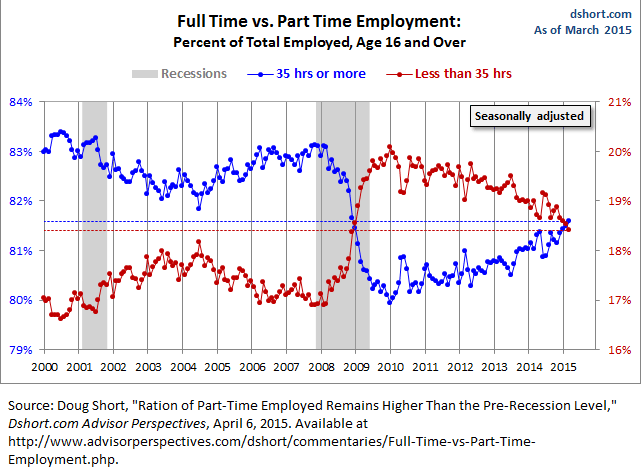Obamacare and Employment (Again)
Vox’s Mattew Yglesias, an undaunted Obamacare supporter, has listed “7 charts that show what Obamacare critics are getting wrong”. The first is, you guessed it, that chart from the Gallup survey of health insurance that this blog has been analyzing and criticizing pretty relentlessly.
I’m not going to go through all seven, but focus on his claim that Obamacare is not causing part-time work at the expense of full-time work. Here it is:
Mr. Yglesias plows new ground in claiming there is no such effect. Previously, Obamacare defenders have admitted there is an effect, but denied it is a problem. (Please see: “Obamacare and employment”.)
Note how Mr. Yglesias chart begins in 2010, just when we finally started climbing out of the Great Recession. Trends in employment are caused by many things. Obamacare is only one of them. However, Obamacare did not cause the Great Recession (having been passed in 2010). And its effects are not bad enough to completely crush recovery. However, as comedian and U.S. Senator Al Franken has said, “It takes a lot more work to drive the car out of a ditch than to drive it into a ditch.”
Financial Advisor Doug Short has a great chart showing how part-time-workers and full-time workers flipped as a result of the great recession. So, as we come out of it, of course full-time workers will gain.
The question is: What is the effect of Obamacare at the margin, notwithstanding all other effects? To answer this question, University of Chicago’s Casey Mulligan is the go-to source. Obamacare clearly induces many workers of a certain income to lose hours.




My experience supports your data on the shift from full to part time work. I have been in search of a full-time position in my field (healthcare/higher education) for over 6 years. I have been able to find part-time work at two restaurants. I am in search for something which fits my faith, skills/talents and meets my and my family’s financial needs. Thanks for your honest data-driven reporting.
Thank you for your comment and I am very sorry to hear your news.